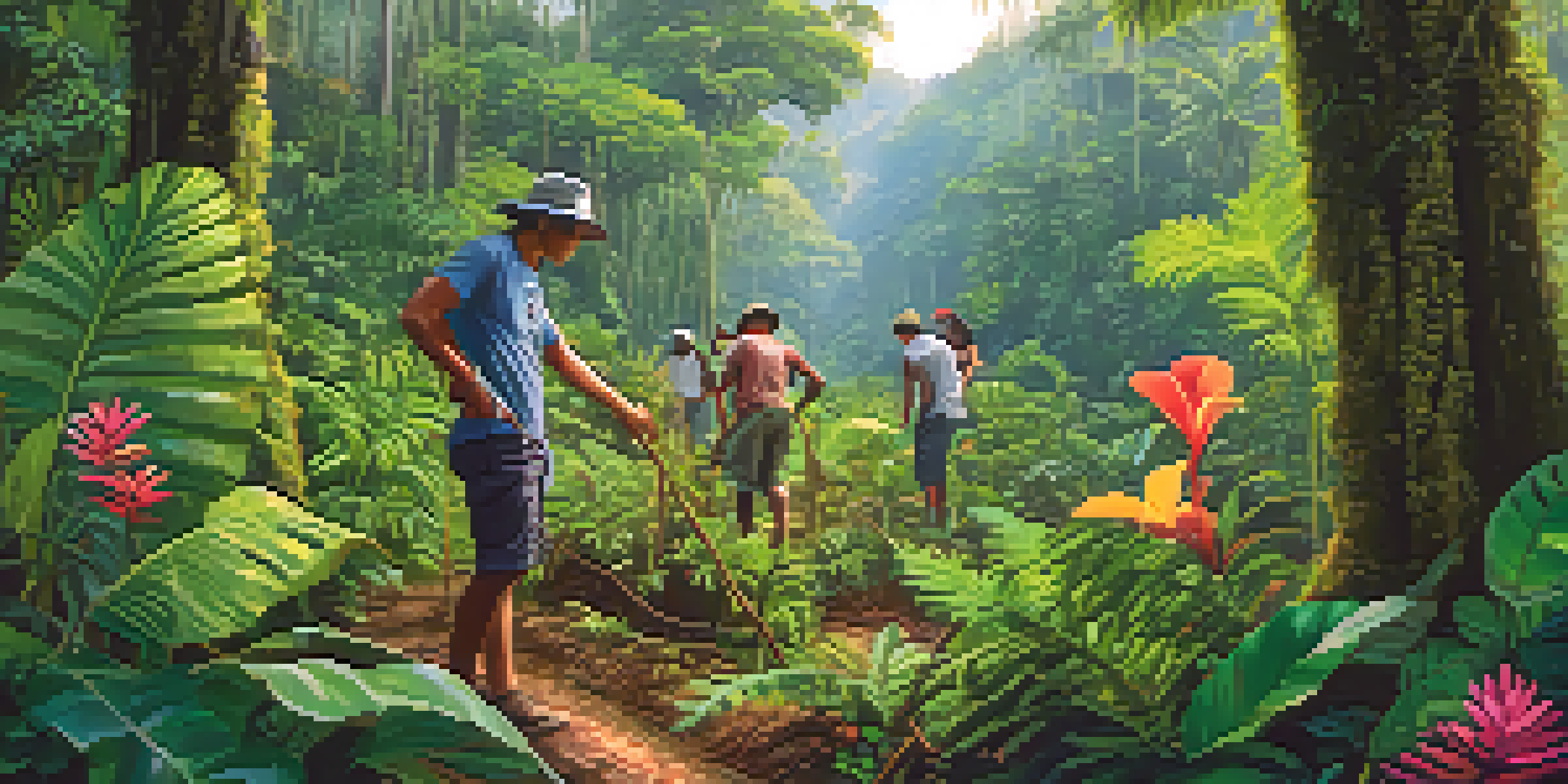Embracing Local Cultures: Volunteer Tourism in Brazil

Understanding Volunteer Tourism and Its Impact
Volunteer tourism, often called 'voluntourism,' combines travel with community service. It's a way for travelers to immerse themselves in local cultures while making a positive impact. This form of tourism has gained popularity as people seek meaningful experiences beyond typical sightseeing.
Volunteering is at the very core of being a human. No one has made it through life without someone else's help.
In Brazil, this trend has flourished due to its rich cultural tapestry and diverse ecosystems. Volunteers can participate in various projects, from conservation efforts in the Amazon rainforest to educational initiatives in urban areas. This not only benefits the local communities but fosters a deeper connection between the volunteers and the culture.
The impact of volunteer tourism can be profound. By engaging with locals, travelers often gain insights into Brazil's unique customs, traditions, and challenges. This exchange of knowledge enriches both the volunteer and the community, creating lasting bonds and shared experiences.
Top Volunteer Opportunities in Brazil
Brazil offers a variety of volunteer opportunities tailored to different interests and skills. For instance, those passionate about wildlife conservation can join programs focused on protecting endangered species like the jaguar or the Amazonian manatee. Alternatively, volunteers interested in education can support local schools with teaching or mentorship.

Programs like EcoVolunteer and Projects Abroad provide structured experiences that ensure volunteers have a meaningful impact. These organizations often work closely with local communities to identify their needs and develop projects that benefit everyone involved. This collaborative approach enhances the effectiveness of the volunteer efforts while promoting cultural exchange.
Volunteer Tourism Enhances Cultural Bonds
Engaging in volunteer tourism allows travelers to connect deeply with local communities, fostering meaningful cultural exchanges.
Regardless of the project chosen, volunteers in Brazil often find themselves in stunning locations, from the lush Amazon to vibrant urban centers like Rio de Janeiro. This combination of purposeful work and breathtaking surroundings makes for an unforgettable experience.
Cultural Immersion: A Key Component
One of the most rewarding aspects of volunteer tourism in Brazil is the opportunity for cultural immersion. Volunteers often stay with local families, allowing them to experience daily life, culinary traditions, and local customs firsthand. This deep engagement fosters a sense of belonging and understanding that typical tourism rarely provides.
The best way to find yourself is to lose yourself in the service of others.
For example, volunteers might learn to cook traditional dishes like feijoada, a hearty black bean stew, or participate in local festivals, gaining insight into Brazilian values and community spirit. These experiences create rich memories and personal connections that transcend mere sightseeing.
Cultural immersion also promotes respect and appreciation for the local way of life. As volunteers engage with communities, they often challenge their own perceptions and gain a broader worldview, enriching their lives and those of the people they meet.
Building Lasting Relationships with Locals
Volunteer tourism in Brazil is about forging connections, not just completing tasks. Many volunteers leave feeling like part of a larger family, having built relationships with locals that often last long after the trip ends. These connections can lead to friendships, future collaborations, and a deeper understanding of Brazilian culture.
For instance, a volunteer working on a community garden project may bond with local families over shared meals and stories, creating ties that transcend language barriers. Such experiences highlight the human side of tourism, emphasizing empathy and understanding.
Sustainability is Key for Impact
Focusing on sustainable practices in volunteer programs ensures that initiatives benefit both local communities and the environment.
These relationships also have a ripple effect. When volunteers return home, they often share their experiences, inspiring others to appreciate and respect Brazilian culture and its people. This word-of-mouth advocacy can lead to more responsible tourism practices and greater awareness of local issues.
Challenges and Considerations of Volunteering
While volunteer tourism offers numerous benefits, it's not without challenges. Volunteers must be aware of the ethical considerations involved, such as ensuring that their efforts genuinely benefit the community and do not create dependency. It's essential to choose programs that prioritize local needs and involve community members in decision-making.
Additionally, cultural differences can pose challenges. Volunteers may encounter language barriers, different social norms, or unexpected situations. However, these challenges often lead to personal growth and adaptability, teaching valuable life skills that extend beyond the volunteer experience.
Being open-minded and flexible is crucial when volunteering in Brazil. Embracing the unexpected can lead to some of the most memorable moments and deepen the overall experience, fostering resilience and understanding in a global context.
The Role of Sustainability in Volunteer Tourism
Sustainability plays a vital role in the success of volunteer tourism initiatives in Brazil. Many programs emphasize environmental conservation and responsible tourism practices, ensuring that projects benefit both the community and the ecosystem. This focus on sustainability helps preserve Brazil's rich biodiversity for future generations.
Volunteers might engage in activities like reforestation, wildlife monitoring, or educating locals on sustainable farming practices. These efforts not only address immediate environmental concerns but also empower communities to adopt long-term sustainable practices.
Preparation Maximizes Volunteer Impact
Thorough preparation, including understanding local customs and aligning skills with community needs, enhances the overall volunteer experience.
By participating in sustainable volunteer programs, travelers contribute to a more balanced relationship between tourism and environmental preservation. This awareness fosters a sense of responsibility, encouraging volunteers to advocate for sustainable practices even after returning home.
How to Prepare for Your Volunteer Experience
Preparing for a volunteer trip to Brazil involves more than just packing your bags. It's essential to research the organization and project you'll be involved with to ensure alignment with your values and goals. Understanding the local culture, customs, and language can also enhance your experience and facilitate better communication with the community.
Additionally, consider your skills and how they can best contribute to the project. Whether you're an educator, environmentalist, or simply someone eager to lend a hand, matching your strengths with the community's needs can maximize your impact and satisfaction.

Lastly, approach your adventure with an open heart and mind. Embrace the challenges and joys that come your way, and be ready to learn from the vibrant culture and the people you meet. This mindset will not only enrich your volunteer experience but also transform your perspective on global citizenship.